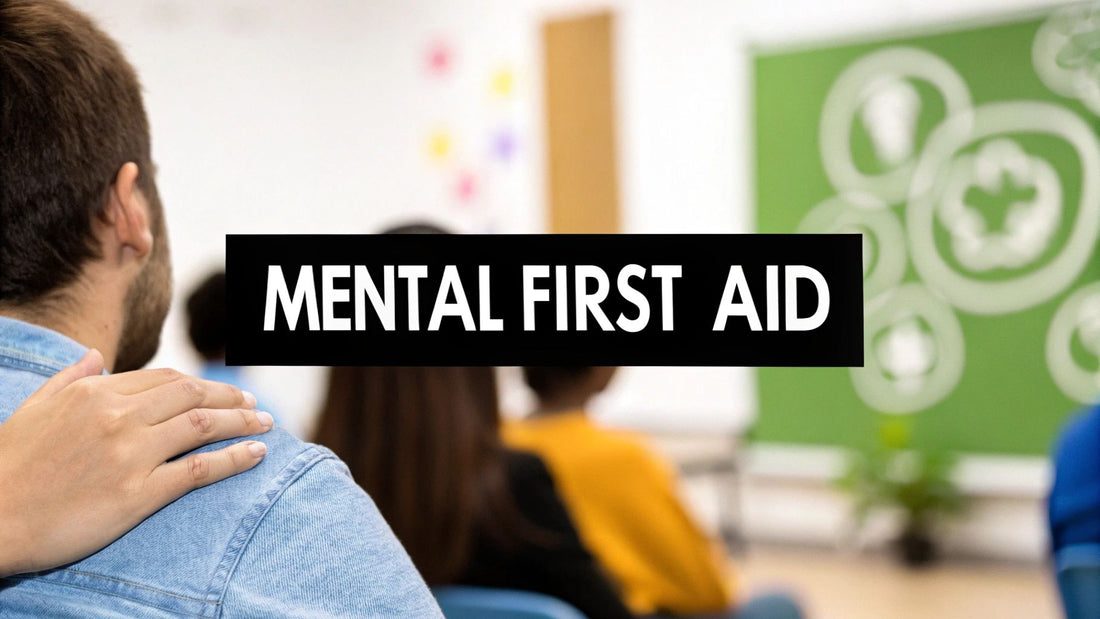
Mental Health First Aid Training: Your Complete Guide
Share
Imagine this: someone trips and sprains their ankle. You’d probably know the basics of what to do – offer a seat, maybe find an ice pack, and help them get proper medical attention. Mental Health First Aid (MHFA) works on the very same principle.
When someone is navigating a mental health challenge or finds themselves in a crisis, a Mental Health First Aider is trained to step in. They provide that crucial initial support, acting as a compassionate bridge until professional help can take over.
What is Mental Health First Aid, Really?
This guide is here to walk you through what this vital training actually involves and why it’s never been more important. We’ll look at how MHFA gives you the skills to recognise the early warning signs of distress, provide immediate comfort, and confidently guide someone towards the right professional support.
Let's be clear: in a world where mental health issues are on the rise, particularly among young people here in the UK, these skills aren't just a "nice-to-have." They are essential. The statistics speak for themselves; poor mental health is estimated to cost UK employers up to £56 billion annually in lost productivity and sick days. Add to that the relentless pressure of social media on our children and teenagers, and the need for trained, empathetic people in our communities and workplaces becomes undeniable.
A big part of understanding Mental Health First Aid is clearing up the fog of confusion that often surrounds mental health. A great starting point is tackling some of the myths head-on by exploring these 10 common misconceptions about mental health.
Now, let's look at what the training pathway looks like. This graphic breaks down the typical time commitment for the different MHFA programmes, including courses for adults, young people, and those needing a refresher.
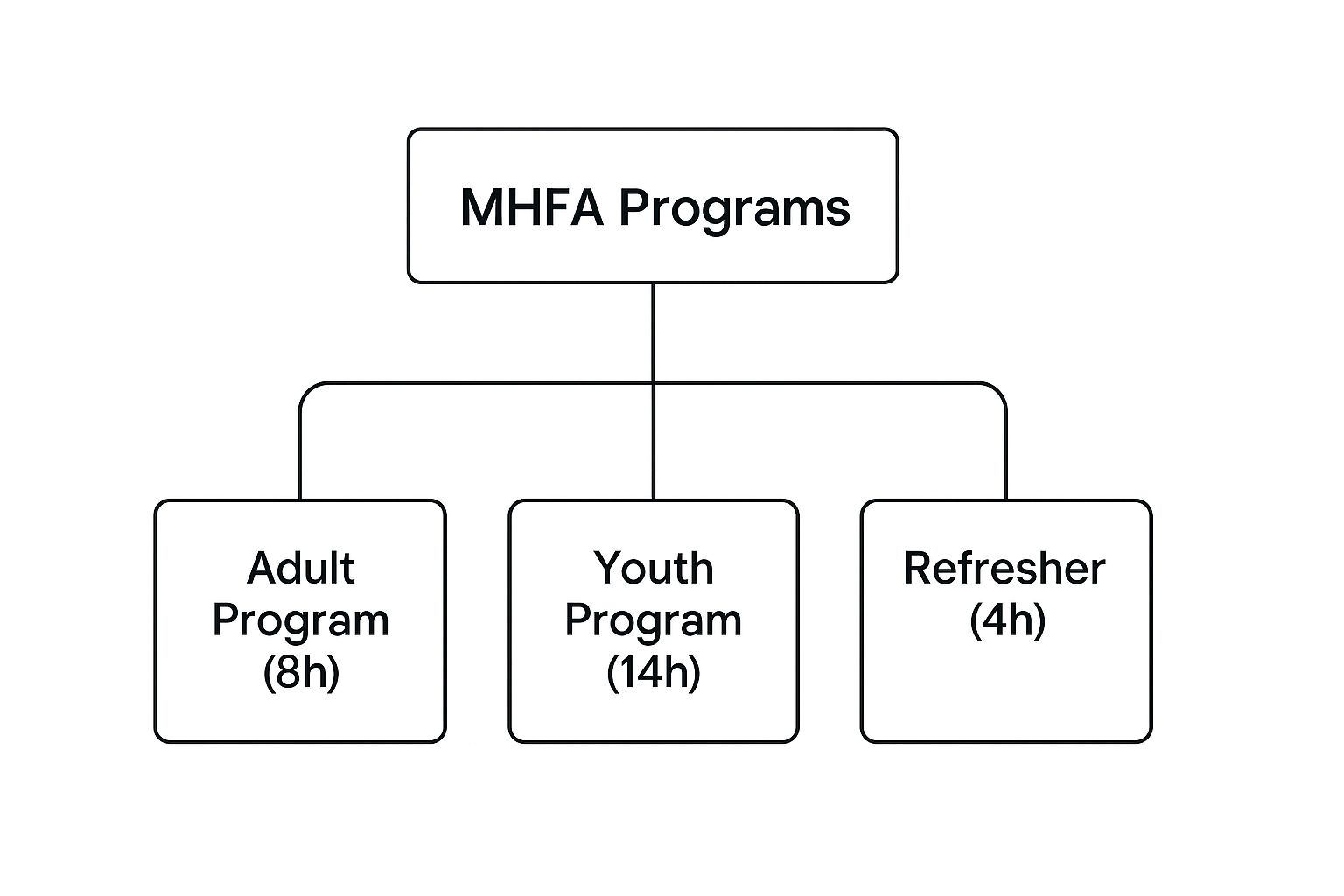
As you can see, the training is specialised. The youth-focused course, for instance, requires more time to really dig into the unique challenges and developmental stages that young people experience.
Building these skills is a journey. As you learn more, you might find yourself curious about related concepts. For example, understanding what trauma-informed care is can add another layer of depth to your supportive conversations. You can learn more about that here: https://thatsokay.co.uk/blogs/news/what-is-trauma-informed-care
A Quick But Important Note: I am not a mental health professional. This guide is designed to be informative and educational. It is absolutely not a substitute for professional medical advice. If you have concerns about your own mental health or someone else's, please speak with a doctor.
Why This Training Matters in the UK
It's no secret that the UK is facing a serious mental health challenge. The need for proper support has never been greater, and the effects of poor mental health aren't just personal tragedies; they create ripples that touch our workplaces, our communities, and the economy as a whole. This is precisely where mental health first aid training steps in, offering a practical and powerful way to respond.
The numbers alone paint a stark picture. In the UK, a staggering 15.8 million workdays are lost every year because of mental health conditions like stress, depression, and anxiety. Think about that for a moment. That's a huge blow to productivity and a clear sign that workplace wellbeing is in crisis. The cost to UK businesses is estimated to be up to £56 billion each year.
When organisations decide to invest in mental health first aid, they're not just ticking a box. They're actively building a culture where people feel safe and supported. Training employees to spot the early signs of distress and listen without judgement creates an environment where problems can be addressed long before they escalate into a crisis. This isn't just good for people; it's good for business, leading to better morale, less time off, and stronger teams.
The Growing Need Among Young People
It’s not just adults who are struggling. Our young people are navigating a world filled with unique pressures. Right now, one in six children in England between seven and sixteen is thought to have a probable mental health problem. That's a frightening jump from one in nine just a few years ago.
Social media often sits at the heart of this, creating a non-stop cycle of comparison and pressure to be perfect. We see it every day: a teenager feeling left out when they see friends together online, or a child struggling with their self-image because of heavily filtered photos. These aren't isolated incidents; they're part of a landscape that can seriously impact a young person's wellbeing.
Having trained adults in schools, youth clubs, and communities provides a critical safety net. These individuals can spot the subtle changes in a child’s behaviour, offer immediate reassurance, and guide them toward the right support, making early intervention possible.
Taking Action in Your Organisation
So, where do you start? Before rolling out any programme, it's vital to understand what your team actually needs by conducting a thorough training needs assessment. This ensures the training hits the mark and makes a real difference.
Ultimately, this training is about building confidence and compassion. It’s about creating a society where reaching out for help is rightly seen as a sign of strength, not weakness.
Exploring the Mental Health First Aid Course
So, what does a mental health first aid training course actually look like on the inside? It’s a world away from stuffy lectures and death-by-PowerPoint. Think of it as an engaging, hands-on workshop designed to build your confidence so you can offer genuine support when someone is struggling. The whole point is to break down the stigma and mystery surrounding mental health, turning complex topics into simple, actionable skills.
The journey usually begins with the fundamentals. You’ll get to grips with common mental health conditions, such as depression, anxiety disorders, and psychosis. The focus isn't on turning you into a doctor, but on helping you spot the early warning signs – those subtle shifts in behaviour or mood that suggest a person might need help. This is especially crucial for identifying issues in children and young people, who often find it difficult to put their feelings into words.
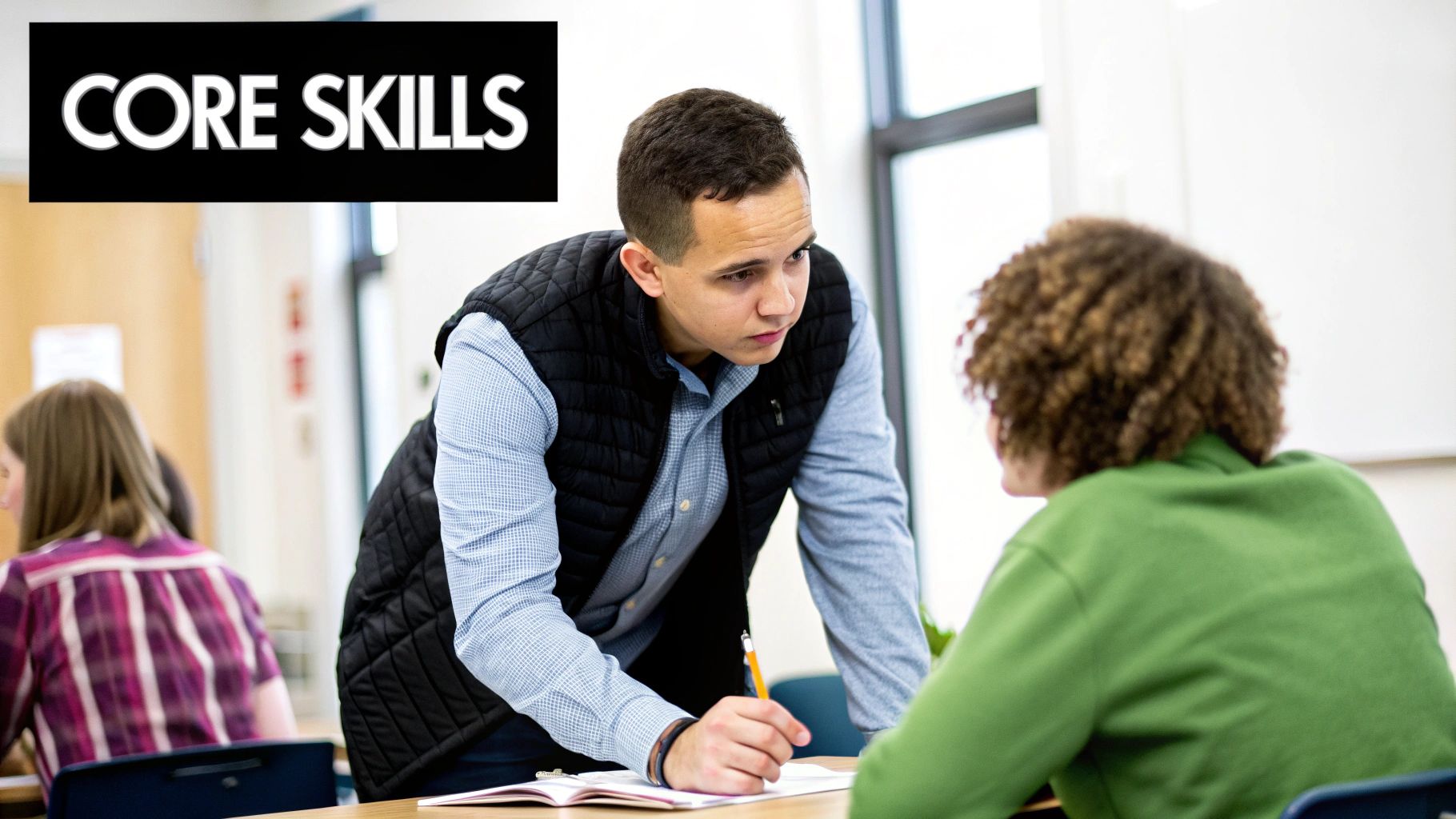
Practical Learning and Real Scenarios
Where the training truly comes alive is in its practical application. You won't be passively listening for hours. Instead, you'll be diving into role-playing exercises, group discussions, and analysing real-life case studies that make the theory stick. This hands-on approach gives you a safe space to practise navigating those sensitive conversations.
For example, you might work through a scenario involving a colleague who has become quiet and withdrawn, or learn how to support a friend who is experiencing a panic attack. These simulations are invaluable; they build the muscle memory and confidence you need to stay calm and act effectively when faced with a real crisis.
A key takeaway from the training is learning how to listen without judgement. It sounds simple, but it’s a powerful skill that can make an enormous difference to someone in distress.
Understanding the ALGEE Action Plan
At the heart of every MHFA course is the ALGEE action plan. It’s a simple, memorable five-step framework that gives you a clear path to follow when providing initial support. If you've ever done physical first aid, think of it as the mental health equivalent of 'DRSABC'.
- Assess for risk of suicide or self-harm.
- Listen non-judgementally.
- Give reassurance and information.
- Encourage appropriate professional help.
- Encourage self-help and other support strategies.
Each step is explored in detail with practical examples, so you walk away knowing precisely how to put it into action. You'll learn what to say, how to offer comfort without making false promises, and crucially, how to guide someone toward professional support from a GP, therapist, or another service. It provides a reliable structure that takes the fear and guesswork out of incredibly difficult situations.
Finally, the course will cover the different ways you can get certified. Some people thrive in the immersive, two-day in-person workshop, feeding off the group energy. Others prefer the flexibility of online modules they can complete at their own pace. Whichever format you choose, the outcome is the same: you’ll be equipped to be a vital first port of call for someone who needs it most.
When you ask who should learn physical first aid, the answer is obvious: everyone. The very same logic applies to mental health first aid training. These aren't niche skills reserved for clinicians or specialists; they're essential life skills that help us build stronger, more compassionate communities, families, and workplaces.
The reality is, anyone and everyone can benefit from becoming a Mental Health First Aider. Think of a line manager who notices a usually bubbly team member has grown quiet and withdrawn. Armed with MHFA skills, they can confidently open up a supportive, non-judgemental conversation and point their colleague towards the right resources before the situation escalates.
Or picture a teacher who spots the subtle signs of anxiety in a student falling behind on their schoolwork. Instead of seeing a simple behavioural issue, that teacher can offer reassurance and connect the child with the school's pastoral care team. This kind of early support is absolutely vital, especially given the pressures young people face today. We dive deeper into this in our post on youth mental health first aid.
A Skill for Every Role
The power of this training isn't tied to a specific job title. It gives people from all walks of life the practical tools to offer that crucial first bit of help and support.
- HR Professionals: They can champion employee wellbeing, manage sensitive situations with more confidence, and help shape a more open and supportive workplace culture.
- Community Volunteers: People running sports clubs, local charities, or youth groups can become a trusted, approachable contact for anyone in distress.
- Parents and Carers: They get a much clearer understanding of the challenges their children might be up against, learning how to listen properly and guide them towards help.
This isn't just about professional development, either. It makes a real difference in your personal relationships. It gives you the confidence to better support friends and family who are going through a tough time, building stronger bonds of trust along the way.
The demand for these skills is clearly growing. In the United States, for example, between 2008 and 2016, around 777,000 people completed MHFA training. The significant increase in rural areas shows just how universal the need is. You can explore more about this growing movement on Mental Health First Aid's research summary.
Ultimately, mental health first aid is for anyone who wants to make a difference. It's for people who believe in creating a world where asking for help is as normal as asking for a plaster.
Putting Your MHFA Skills into Practice
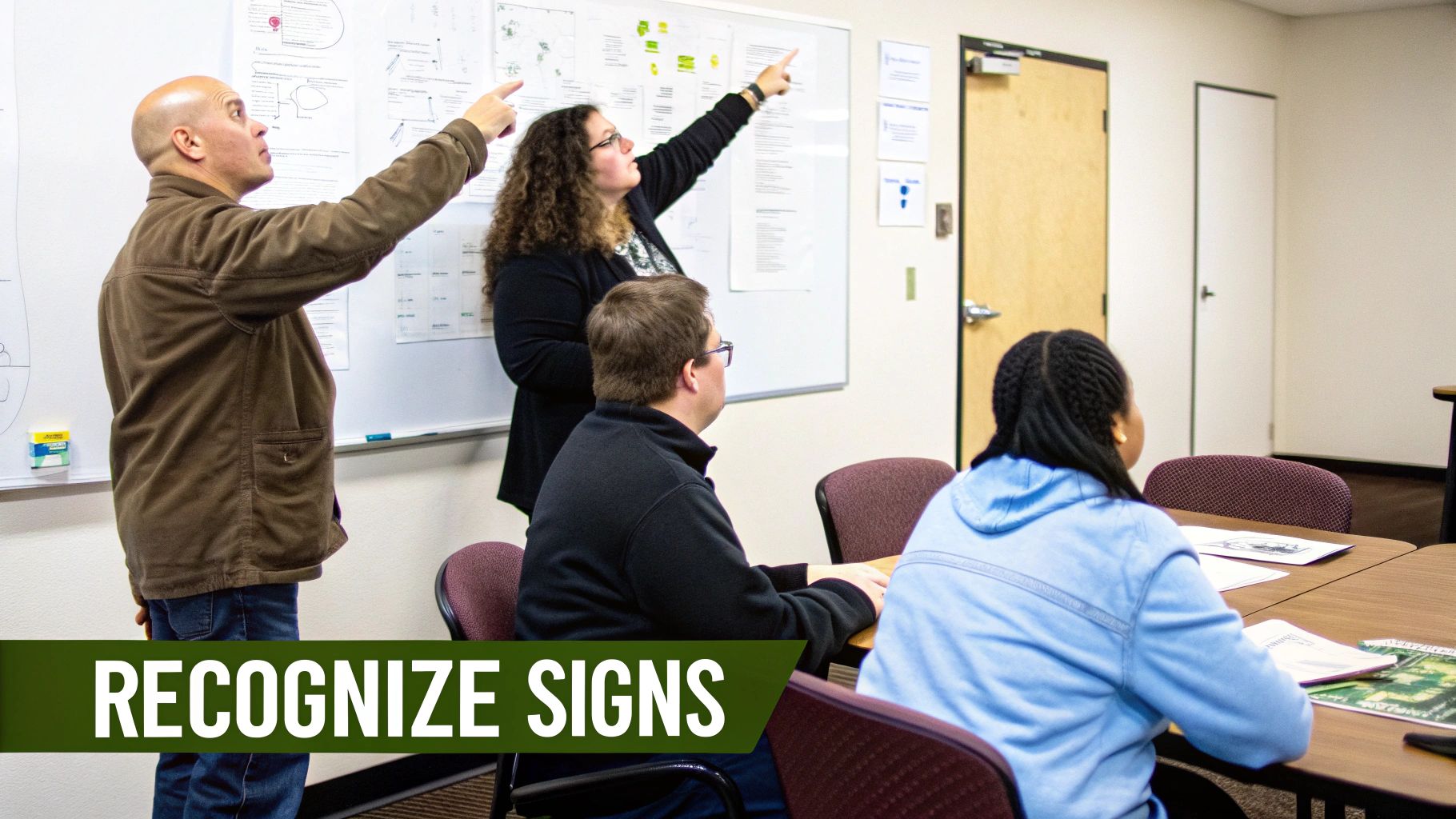
Finishing your mental health first aid training is a brilliant first step. But taking that knowledge out into the real world? That can feel like a whole different ball game. The most important thing to hold onto is your role: you're there to be a bridge, not a therapist. Confidence comes with practice, and it starts by knowing what to do in situations you're likely to encounter.
Let’s say you notice a colleague who has been quieter than usual and seems visibly upset. This is where the ALGEE framework comes into play. Your first move is to Approach them, but do it privately and without judgement. A simple, gentle opener like, "I've noticed you seem a bit down lately, is everything okay?" can create a safe space for them to share.
If they decide to talk, your next job is to simply Listen. Don't jump in with solutions or advice; just give them your full, uninterrupted attention. After they've spoken, you can Give them reassurance. Something as simple as, "It sounds like things are really tough right now. Thank you for telling me," can make a world of difference.
Responding in a Crisis
What happens when you’re faced with something more urgent, like a colleague having a panic attack? They might be hyperventilating, feeling dizzy, or completely overwhelmed by fear. Your calm presence is your greatest asset here.
Speak softly and guide them through a grounding technique to help them reconnect with the present moment.
The '5-4-3-2-1' sensory exercise is a fantastic tool for this. You can calmly ask them to:
- Name 5 things they can see around them.
- Focus on 4 things they can feel (like their feet on the floor or the texture of their chair).
- Listen for 3 things they can hear.
- Identify 2 things they can smell.
- Name 1 thing they can taste.
This simple exercise gently shifts their focus away from the rising panic and anchors them in their immediate surroundings. For companies wanting to make this kind of support a core part of their workplace, looking into practical employee wellness program ideas can help build a culture where everyone feels supported.
The Bridge to Professional Help
The final, crucial steps in the ALGEE model are to Encourage professional help and Encourage self-help strategies. Your goal isn't to fix their problems but to empower them to find the right support. This could mean suggesting a chat with their GP or sharing contact details for a mental health charity. One simple relaxation tip you can share is the 'box breathing' technique: breathe in for four seconds, hold for four, breathe out for four, and hold for four. It's a simple, discreet way to manage rising stress.
Important Disclaimer: I am not a mental health professional. The techniques discussed here are for initial support only. If you are worried about your own or someone else's mental health, it is essential to seek advice from a doctor or a qualified healthcare provider. Your role as a Mental Health First Aider is to provide immediate care and guide them towards the experts.
Continuing Your Mental Health Awareness Journey
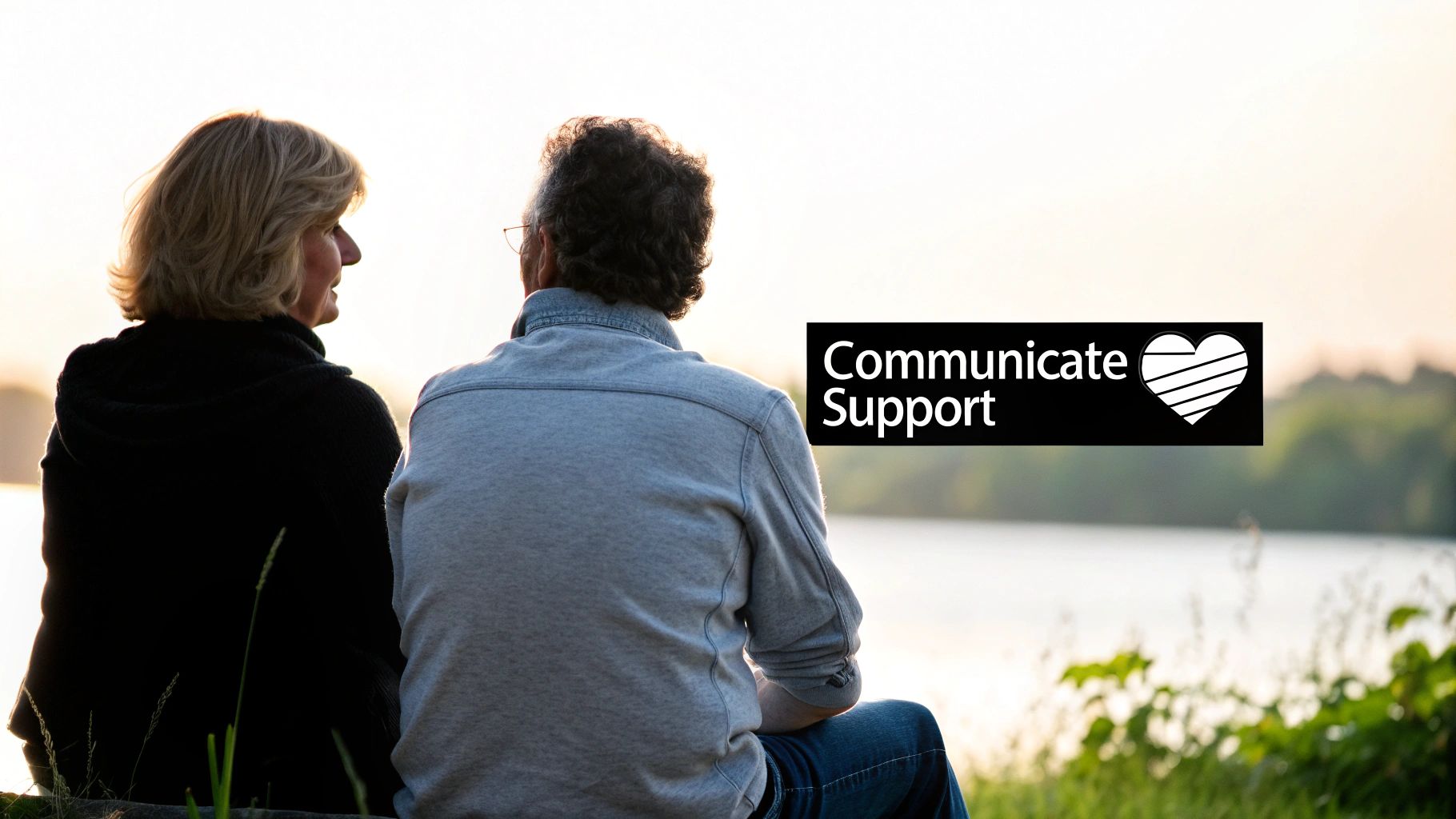
Finishing your mental health first aid training is a brilliant first step, but it’s really just the beginning of a longer journey. To make a real, lasting impact, the key is to stay engaged and keep that learning momentum going.
One of the most powerful ways to deepen your understanding is by stepping into the shoes of others through their stories. Reading mental health books opens a window into different lived experiences, building your empathy and broadening your perspective in ways a training course alone never could. These personal narratives add a layer of human context to the practical skills you’ve learned.
Resources to Broaden Your Understanding
Of course, books are just one avenue. There are countless ways to continue being an advocate for better mental health. Even social media, which often gets a bad rap, can be a fantastic tool if you use it mindfully. Following reputable mental health charities and advocates keeps you in the loop and connects you with a wider community of support.
This ongoing learning is especially critical when it comes to young people. In England, an estimated one in six children aged seven to sixteen has a probable mental health problem, a statistic that highlights just how vital it is to stay informed. If you support teenagers or young adults, looking into specific mental health resources for teens is a fantastic next step.
It's important to remember my role here is purely informational. I am not a mental health professional. If you are ever worried about your own wellbeing or that of someone else, please seek advice from a doctor.
You can also weave mental health advocacy into your everyday life. Something as simple as wearing mental health-themed apparel can be a quiet signal of solidarity, sparking conversations and helping to normalise these discussions. It might mean suggesting MHFA training at your workplace, or just sharing a simple relaxation technique with a friend who's having a tough day. Every small action helps build a more compassionate and understanding community.
Your Questions About MHFA Training, Answered
Taking the first step into mental health first aid can bring up a lot of questions. It’s completely natural to wonder what it all involves. Let's walk through some of the most common queries to give you a clearer picture of what the course is really like and the difference it can make.
Will I Actually Be Qualified to Help?
This is probably the biggest question people have. Will I know what to do? Am I going to make things worse?
The short answer is yes, you will be equipped to help. The training gives you a solid, practical framework to follow – the ALGEE action plan – so you’re not just guessing. It teaches you how to act safely and effectively, while also understanding your own boundaries. Think of it less like becoming a therapist and more like learning physical first aid. You're there to provide immediate, compassionate support and help guide the person toward the professional help they need.
It's really important to stress that I'm not a mental health professional, and this guide is purely for educational purposes. If you're worried about your own mental health or someone else's, please reach out to your GP or another qualified professional for support.
Is This Just a Course for the Workplace?
Not at all. While MHFA skills are a massive asset in any workplace, their real value is that they are life skills. You can use them anywhere, with anyone.
Think about it from a parent's perspective. You're better able to understand the pressures your children are facing, from school stress to the impact of social media. With one in six children in England aged 7-16 now having a probable mental health problem, these skills are arguably just as vital at home as they are in the office. They're for your community, your family, and your friends.
There are also plenty of other ways to show you're an ally for mental health. Something as simple as wearing mental health apparel can open up a conversation, and reading a few good mental health books can give you a much deeper understanding of what others might be going through.
Becoming a Mental Health First Aider is about being a link in the chain of support. Your role is to provide initial comfort and reassurance, acting as a crucial bridge to professional care, not to replace it. It’s about being human, present, and prepared to help.
At Little Fish Books, we believe in nurturing emotional literacy from a young age. Explore our collection of books, activities, and supportive merchandise designed to help children and adults navigate their feelings with confidence. Discover our resources at https://thatsokay.co.uk.
